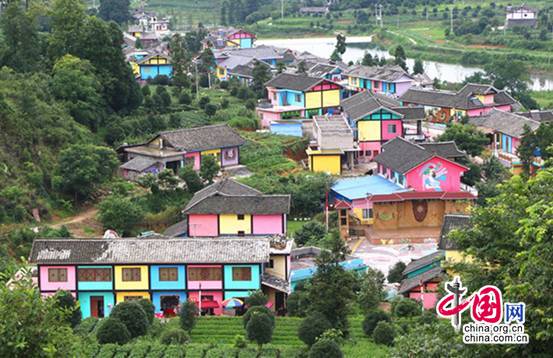Village reinvents itself with colorful cottages, eco-tourism
Jinhua village, or the "village of colors," nestled deep in the mountains of southwest China's Guizhou Province, is known for its tea and, now, its eco-tourism.
Jinhua village, or the "village of colors," nestled deep in the mountains of southwest China's Guizhou Province, is known for its tea and, now, its eco-tourism.

Scattered among the lush green mountains are brightly colored cottages with fairy and butterfly designs adorning the walls. No two houses are alike. The sweet fragrance of tea leaves drifts over from the plantations.
"I'm a farmer, and I' m happy," says a sign at a tea plantation. This is a place that is prospering.
But just a few years ago, the village, with less than 300 people, was struggling. People could barely scrape together a living from selling tea.
"There has to be a way to end poverty," said Feng Yanqing, the village's Party chief. "We found our way, which is to turn houses and plantations into tourist attractions, parks, and eventually prosperity."
Tourism is the key to prosperity in Jinhua village. To attract tourists, villagers painted their houses with various colors and patterns. Cartoon characters are everywhere.
"A lot of houses were vacant, since many people had left the village to find work elsewhere," Feng said. "We redecorated them and turned them into hostels."
Apart from farmers, the villagers now have their new identities -- innkeepers, tea factory owners, singers and dancers. When night falls, they put on shows for tourists at the county square.
Xu Xueshu, 52, used to grow tea. Now he runs a hostel and a milk tea bar, earning over 10,000 yuan (about 1,500 U.S. dollars) a month. Xu's son has started a band, putting on performances for wedding ceremonies and bonfire parties.
In less than three years, there have been dramatic changes in the village and the lives of villagers. Before 2015, locals would have been lucky to earn about 8,200 yuan a year, but now, they take home almost four times that amount. Last year, the village received around 500,000 visitors. The economic success has also lured migrant workers back home.
"We used to long for city life, but now, I prefer to stay here," Xu said with pride. "I'm a farmer and I'm happy. You could offer me a house in the city, but I wouldn't take it."

